you might be entitled to compensation, but unlike an ordinary auto accident, the process can be far more difficult.
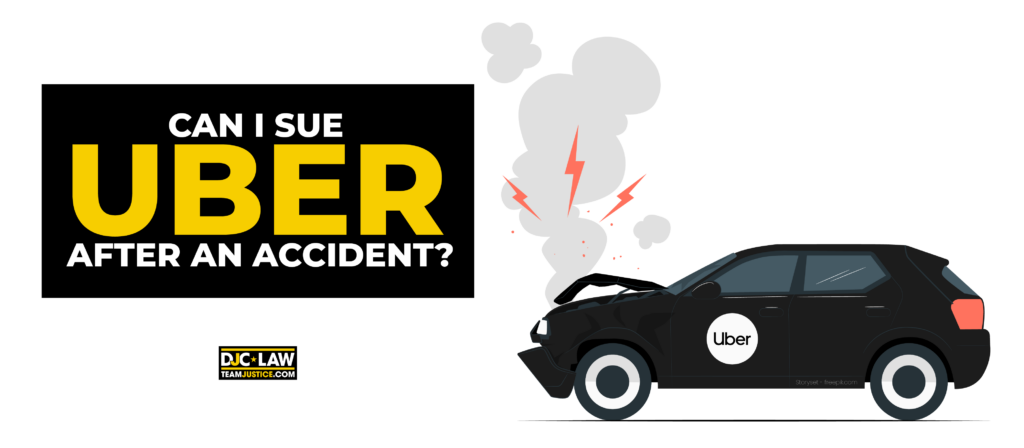
Major ridesharing companies have complicated terms of use designed to protect themselves from being sued by car accident victims. With so much red tape, you need a San Antonio Uber/Lyft accident attorney to help you navigate the process and get compensation for your accident injuries.
In this guide, we outline whether you can sue, how to claim compensation, and what to do after an Uber or Lyft accident.
Key Takeaways
You are entitled to compensation if you were injured in a ridesharing accident. However, you may be unable to sue Uber or Lyft because of the forced arbitration clauses contained within their terms of use.
If a driver is carrying a passenger or collecting a passenger, you can claim through the $1 million liability policies held by Uber and Lyft.
If a driver isn’t carrying or collecting a passenger, regardless of whether the rideshare app is open, you can claim compensation through the driver’s personal car insurance policy.
You may be able to sue Lyft or Uber’s insurance companies directly instead of suing the companies themselves.
After a rideshare accident, it’s vital to speak to a lawyer to understand your rights and go through your options.
Can You Sue a Rideshare Driver if You’re a Passenger Who’s Injured?
Accident victims are perfectly entitled to file a personal injury lawsuit against a rideshare driver if they’re injured. You can file a personal injury case through a car accident attorney whether you’re a driver or a third party.
Uber and Lyft’s terms of use only impact whether you can sue them. Since rideshare drivers aren’t employees of the company but independent contractors, these same protections don’t apply to them.
Did Your Uber Driver Get Into an Accident?
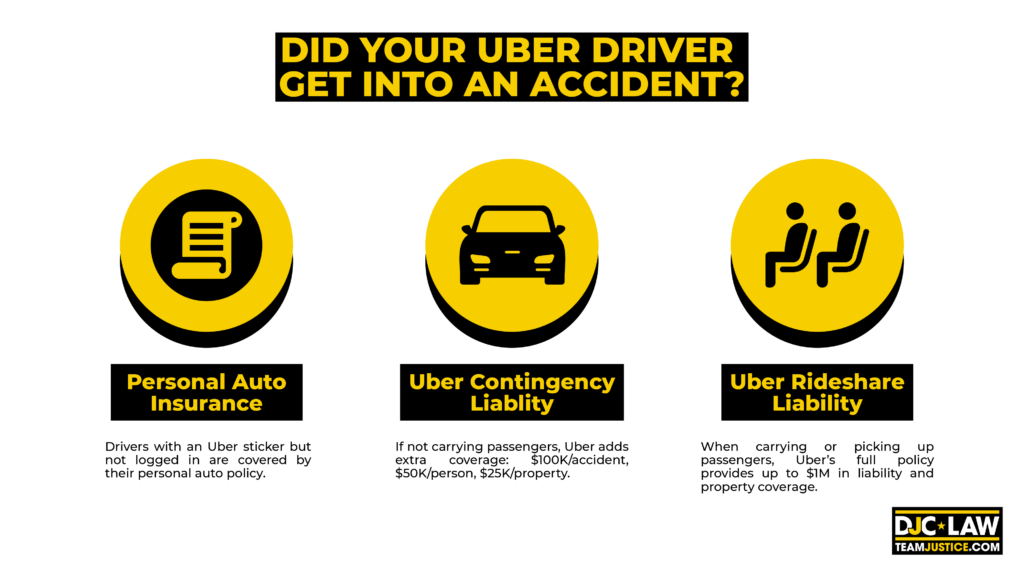
Uber's drivers are fully covered by three types of auto insurance. You’re entitled to claim against the driver’s insurance. However, if a rideshare driver is actively driving passengers or is on the way to collect passengers, you can make a claim against Uber’s full insurance policy.
The three types of insurance policies that may come into play include:
Personal Auto Insurance – Rideshare drivers using a car with an Uber sticker but aren’t logged into the app will be covered by their personal auto insurance policy. The limits of this policy will depend on your state’s minimum insurance coverage limits.
Uber Contingency Liability Policy – Uber accidents involving drivers not carrying passengers will still involve reverting to the driver’s personal auto insurance policy. However, since they’re still technically working between fares, Uber provides extra liability coverage, accounting for $100,000 per accident, $50,000 per person, and $25,000 in property damage.
Uber Rideshare Liability Policy – If a driver is carrying passengers or on the way to pick up passengers, they’re technically working, and so Uber’s full insurance policy comes into play. This is worth up to $1 million for liability coverage and another $1 million in property damage coverage.
In other words, whether you file a personal injury lawsuit against the driver really depends on the circumstances. If you were a passenger at the time, the company's insurance policy might cover your losses entirely without filing a separate lawsuit.
Did Your Lyft Driver Get Into an Accident?

Lyft’s insurance policy, and when it comes into play, is split into four distinct periods outlined on its website. Like Uber, you can only access their full insurance policy if your Lyft driver is carrying or picking up passengers. Currently, Lyft provides $1 million in third-person liability and $1 million in uninsured/underinsured motorist coverage.
Let’s break down the four periods:
Period 0 – The Lyft app is switched off, and the driver uses their car for personal reasons.
Period 1 – The Lyft app is open, and the driver is waiting for a ride request.
Period 2 – The Lyft app has matched the driver with a passenger, and they’re on the way to pick them up.
Period 3 – The Lyft driver is carrying a passenger.
In the same way as Uber, you’ll only gain access to Lyft’s full insurance coverage if the driver is carrying a passenger or on the way to collect one. If neither is true, you’ll claim against the driver’s policy.
What Should I Do As a Passenger After a Car Accident While in an Uber/Lyft?
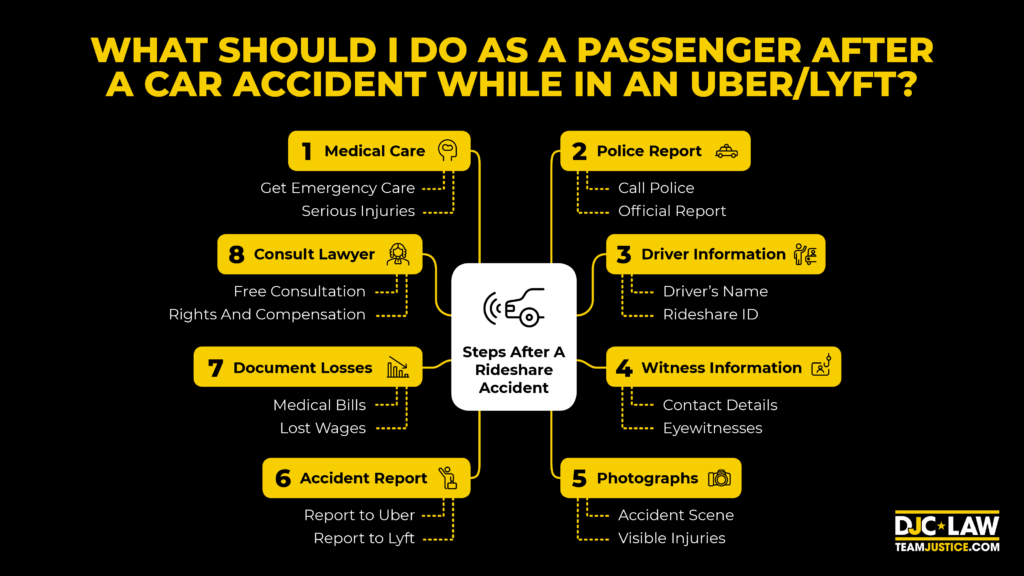
If you’re involved in an Uber or Lyft accident, it’s critical that you seek immediate medical attention, gather evidence if safe to do so, and then call a lawyer to discuss your next steps. Doing anything else puts your health at risk and may even result in you not getting the compensation you deserve.
For example, let's say your Uber driver ran a red light and you were injured. Follow these steps immediately after a Lyft or Uber accident:
Get emergency medical care, even if you feel fine. Many serious injuries, such as whiplash, can take days to surface.
Call the police and ensure they fill out an official police accident report.
Exchange information with the driver. Get the ridesharer driver’s name and rideshare ID number.
See if you can get information from anyone else involved or eyewitnesses. Take down their contact details.
Take photographs of the car accident scene and any visible injuries using your phone.
Report the accident to the relevant rideshare company. Both Uber and Lyft have online portals for reporting accidents.
Keep track of all your losses, including medical bills and lost wages. Documenting your losses lets you pursue your rightful compensation as part of your personal injury lawsuit.
Call a lawyer for a free consultation to discuss what your rights are, whether you have a right to compensation, and which option is best.
How Much Compensation Can I Get from a Rideshare Accident Claim?
Uber and Lyft have $1 million liability insurance policies, enabling you to claim up to this amount for your losses. You can also sue the driver through their personal auto insurance policy in some circumstances.
Note that Uber and Lyft’s terms of use protect them from being sued directly for an accident. Recently, a New Jersey couple suffered a setback in their pursuit of suing Uber because of the forced arbitration clause within their terms of use.
Forced arbitration means app users agree not to sue Uber if they’re injured while using the service. Unfortunately, the legitimacy of this provision is currently making its way through the court system, with the case in question potentially making its way to the New Jersey Supreme Court.
How Does Insurance Coverage Work After a Rideshare Accident?
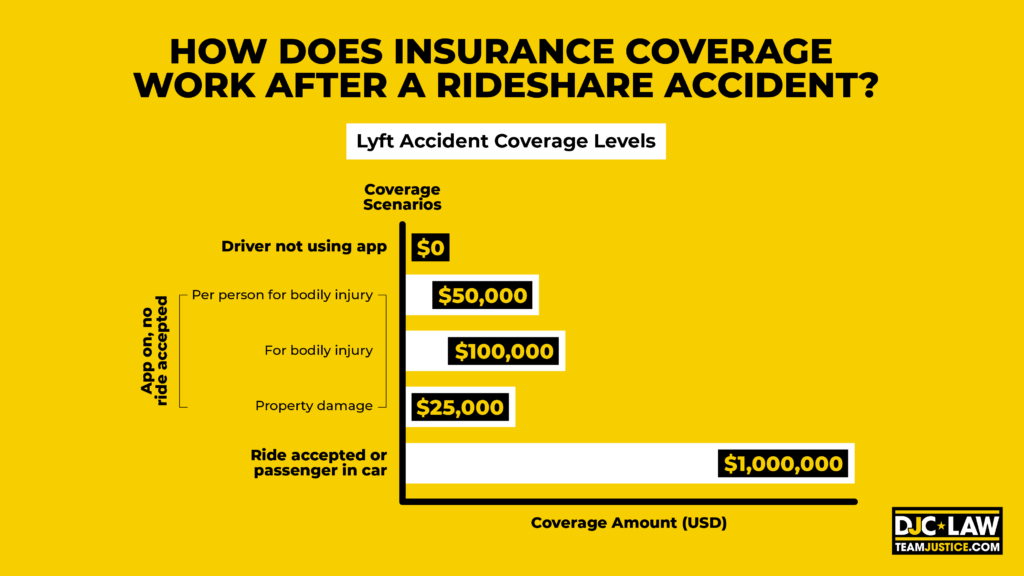
Every Lyft and Uber driver who picks up passengers is going to have insurance. At the very minimum, both companies provide a policy with some coverage. Since drivers can be personally liable for injuries they cause, many will purchase supplemental coverage, over and above what Lyft and Uber provide.
The following levels and types of coverage apply to a Lyft accident:
If the Lyft driver is in their car and they do not have their app on, the driver's auto insurance coverage will apply and cover any accidents.
If the app is on, but the driver has not yet accepted a ride request, there is $50,000 per person for bodily injury, $100,000 for bodily injury, and $25,000 for property damage.
If the Lyft driver has accepted a ride request or there is a passenger in the car, then there is $1 million in coverage on a per-accident basis.
While $1 million seems to be a headline-grabbing number, it is not nearly as large as you think when you have suffered a severe injury in a Lyft accident. Further, there may be numerous people who are all trying to gain access to the same policy. $1 million is not the maximum for your injuries; it is the ceiling for the entire accident for all the people involved in the crash.
You Might File a Lawsuit Against Rideshares Insurance Company After the Accident
Another option that might make sense in your circumstances is to sue the rideshare company's insurer after an accident.
Prominent on Lyft's website is a mention of its "trusted insurance partners." Simply stated, if a for-profit company like Lyft says that it trusts an insurance company, you should not trust that company. Lyft pays the insurance companies significant premiums and tries to wash its hands of your problems and injuries.
Lyft works with the following insurance companies:
Mobilitas
State Farm
Progressive
Liberty Mutual
Allstate
The same goes for Uber. Here’s a list of some of the insurance companies they work with:
Progressive
Mercury Insurance
USAA
Allstate
All of These Insurance Companies Have a Reputation for Playing Hardball with Claims
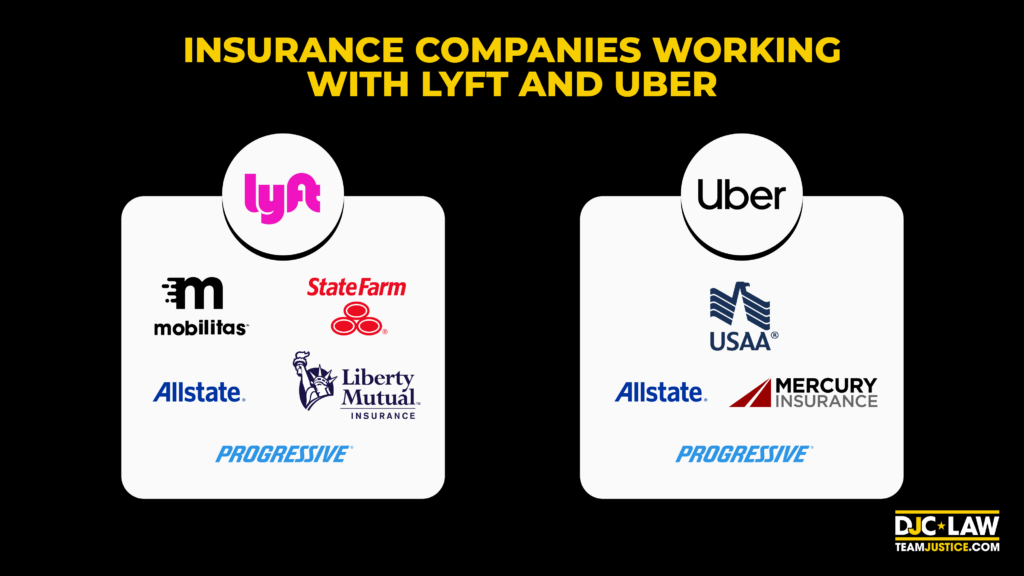
None of these insurance companies have a particularly good reputation for doing right by accident victims who file claims. Instead, there are decades' worth of horror stories of how they pushed around accident victims and cost them money. If you deal with any of these insurance companies in a rideshare claim, you must be cautious and hire a car accident attorney immediately. Otherwise, you can be left with the short end of the stick when you get a settlement check for far less than you deserve (if you even receive one).
Who May Be Responsible for Your Lyft Accident Injuries
Lyft and Uber accident cases have the same rules as any personal injury case. To qualify for financial compensation, someone must have been negligent and caused your accident. If you were a passenger in the rideshare car, there are the following scenarios:
The rideshare driver was to blame for the accident that injured you. You and the car's driver and passengers will potentially file claims against the insurance policy.
The driver of the other car involved in the accident was legally responsible; therefore, you will file a claim against their insurance policy.
Both drivers shared the blame for the accident. Thus, both insurance companies will split the payment of your damages.
It may take some investigation to determine the cause of the accident. An experienced rideshare accident lawyer can help establish who was to blame and where you will need to go to claim your compensation. There are some close cases where either driver can be responsible for your injuries, and each may tell a different story.
How To File a Claim for a Uber/Lyft Accident Injury
Once you know the responsible party, you must file a claim against their insurance policy. Lyft's and Uber's insurance policies should protect the driver because they act in their own capacity and are personally liable for your damages.
You will then file the actual claim or lawsuit. You will often begin dealing directly with the insurance company instead of starting your case in court. Your lawyer will include evidence that should prove liability in your claim, along with documentation supporting the damages you seek.
The insurance company will take its time to closely review your case, trying to find a strategy that it can use to cost you money.
Uber's/Lyft's Insurance Company May Not Respond How You Expect
The insurance company will respond to your claim by denying it or offering a settlement offer. If you were a passenger who suffered an injury in the accident, the rideshare brand's insurance company might be on much shakier ground when it declines to pay your claim. If you were another driver in an accident with the Lyft driver, the insurance company may try to point a finger at you.
If the insurance company does make you a settlement offer, it is certainly not a cause for rejoicing. The initial offer may show how far you must go until you can reach a settlement, and the early offers are likely to be for pennies on the dollar. Your attorney must continue negotiations to get you more compensation. You can expect the insurance company to raise its settlement offer under pressure from your lawyer.
When Should You File a Lawsuit?
There may come a point where you have to sue Lyft's or Uber's insurance company to get fairer compensation for your injuries. Sometimes, you can draw a line and take some of the power out of the insurance company's hands. Insurance companies do not get to decide anything in your case. They can make settlement offers that you decide whether to accept, and if you cannot reach a compensation agreement, the jury will decide.
Note that insurance companies rarely let things go that far. They may try to see what they can get away with, but they also know that a jury may not see things their way and can order them to pay more. Insurance companies are also conscious that they do not have unlimited power to act however they want. They can be potentially subject to a bad faith lawsuit if they push things too far. Hiring an Uber/Lyft accident lawyer is an excellent way to remind insurance companies that they do not have unlimited power and are accountable under the law.
Can You Sue Lyft/Uber Drivers?
There are certain limited circumstances in which you can sue the rideshare company themselves. Random drivers will come to them off the street, and they can have you in the back of their car within days. During that time, the rideshare companies should check the driver's history and criminal record to ensure safety. A basic check can often weed out drivers that may put you and your family in danger.
There have been numerous instances in which these brands have cut corners and not performed the promised background checks. In some cases, passengers have been the victim of sexual assaults by Lyft drivers. In other instances, Uber and Lyft did not adequately screen hazardous drivers who went on to cause serious accidents. In those cases, you can sue directly. Recently, there have been over 200 sexual assault cases filed against Lyft, and the company has had to face a federal judge in multidistrict litigation.
The days of Lyft trying to hide behind legal formalities to evade responsibilities for its shortcomings while continuing to make large profits may rapidly draw to a close. A Uber/Lyft accident attorney will review your situation to determine the best way to get total compensation after your accident injuries.
Why You Need a Uber/Lyft Accident Attorney for Your Case
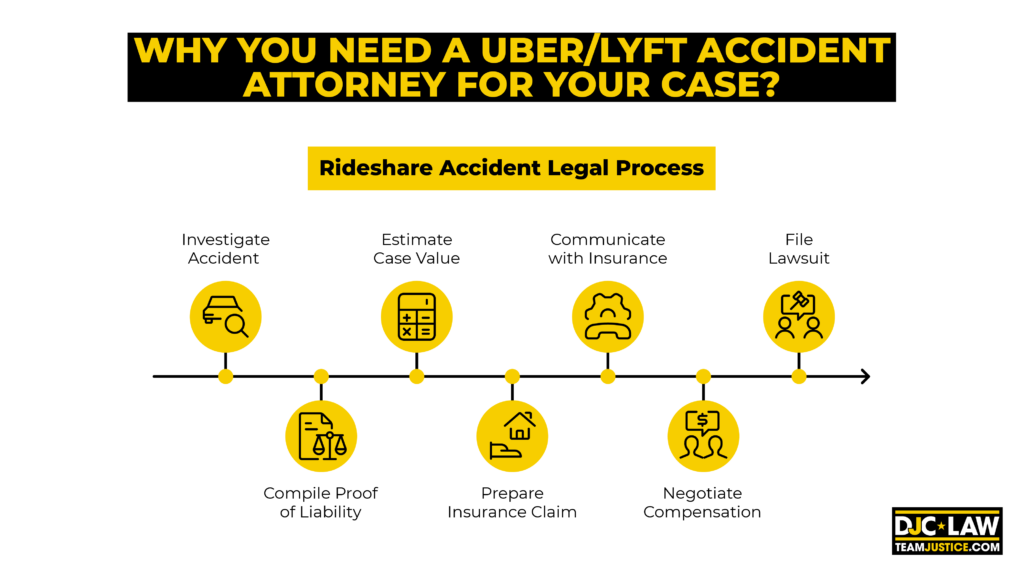
No matter the circumstance, you always need a rideshare accident attorney to handle your case. Insurance companies see tens of thousands of claims each month, and they see it as an opportunity to save money. The only way an adjuster will listen to what you say is if it comes through your attorney.
Your rideshare accident attorney can do the following in your case:
Investigate the cause of your accident and determine who may be held responsible
Compile the proof of liability that you will need to submit with your claim
Estimate the value of your case after reviewing your facts and circumstances
Prepare the insurance claim and file it with the insurance company
Communicate with the insurance company on your behalf, keeping you from having to engage in too many of the details of the case
Negotiate total and fair financial compensation for your accident injuries.
File a lawsuit if you cannot reach a settlement, hopefully getting some measure of accountability from the insurance company
Uber/Lyft's Insurance Companies Will Push Around Claimants Who Do Not Have a Lawyer
Insurance companies will not take you seriously if you try to deal with them alone. They respond to threats, however, and their biggest fear is that you will try to fight them in court. When you hire an experienced attorney to handle your case, insurance companies know you have someone who can take legal action to hold them accountable when they try to take advantage of you.
The aftermath of a Lyft or Uber accident can be a stressful and confusing experience. If you find yourself in this situation, always remember that you have rights and options. One of the most important options is hiring an Uber/Lyft accident lawyer. The great news is that you don't have to worry about the cost, as hiring a Uber/Lyft accident lawyer does not cost you anything upfront.
Uber/Lyft Accident FAQs
Can I Sue Uber if I Wasn’t a Passenger?
Non-passengers can still take advantage of Uber’s insurance policy if they aren’t a passenger at the time. However, the same rules apply as to whether you would claim through the driver’s personal insurance policy or Uber’s liability coverage.
The same principle also applies to Lyft and other rideshare companies.
Can I Sue Uber/Lyft if My Driver Wasn’t At Fault?
No, because the driver wasn’t at fault. Instead, you would sue through the at-fault driver’s insurance company. In this case, how much you would be entitled to would depend on their coverage. If the insurance payout isn’t sufficient, you can also explore the option of suing the at-fault driver personally for excess costs.
Do I Need a Personal Injury Attorney to Claim Compensation After a Rideshare Accident?
You should always enlist the help of an experienced rideshare accident attorney after an accident. This is essential for understanding your rights, how much you could be entitled to, and pursuing the maximum compensation.
Don’t allow Uber, Lyft, or other big companies take advantage of you by trying to fight your own case!

